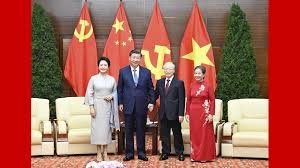
زيارة شي إلى فيتنام
By Mirvat Sibaii*/
Abstract
This article explores the recent developments in Chinese-Vietnamese relations and their implications for U.S. foreign policy in Southeast Asia. By examining the strategic interactions among the U.S., China, and Vietnam, we assess the geopolitical shifts in the region, focusing on maritime disputes, economic partnerships, and military collaborations.
Introduction
The recent summit between Chinese and Vietnamese leaders has marked a significant development in their bilateral relations, highlighting key areas such as maritime patrols, trade, and crime prevention. This comes amid a strategic recalibration by the United States in Southeast Asia, exemplified by President Joe Biden’s recent visit to Vietnam. This paper analyzes these developments and their broader implications for regional dynamics and U.S. strategic interests.
1. The U.S. Strategy in Southeast Asia
The U.S. has been enhancing its relationship with Vietnam, focusing on economic, technological, and military aspects. This includes discussions on aviation and technology deals and military cooperation. The U.S. aims to counterbalance China’s growing regional influence by strengthening ties with Vietnam, a pivotal Southeast Asian nation. A senior U.S. official was quoted saying, “Our engagement in Southeast Asia, particularly with Vietnam, is a cornerstone of our broader Indo-Pacific strategy to balance the growing influence of China in the region.”
2. Sino-Vietnamese Relations and Their Implications
The recent China-Vietnam summit signals a move towards resolving longstanding maritime disputes in the South China Sea, a strategically vital region. These developments are significant from the U.S. perspective, as they could influence regional dynamics and, consequently, U.S. strategic interests. A report from the Center for Strategic and International Studies (CSIS) notes, “These evolving dynamics are crucial from a U.S. standpoint, as they bear direct impact on the regional power equilibrium and, by extension, on America’s strategic positioning.”
3. Vietnam’s Balancing Act
Vietnam continues to carefully navigate its relationships with both the U.S. and China. Focused on economic growth and sovereignty, Vietnam maintains a delicate balance between these major powers, reflecting its strategic position in Southeast Asia and its role in the broader geopolitical landscape. A senior diplomat at the U.S. Embassy in Hanoi mentioned, “Vietnam’s adept balancing act between major powers is reflective of its significant strategic position and influence in Southeast Asia.”
4. The Future of U.S.-Vietnam Relations
Enhanced U.S.-Vietnam relations are a critical component of the U.S.’s broader Indo-Pacific strategy. The evolving relationships between China and Vietnam, and between Vietnam and the U.S., will be crucial in shaping the future geopolitical landscape of Southeast Asia. As stated by a Pentagon official, “The evolving relationship between Vietnam and the U.S., alongside the Vietnam-China dynamic, is key in shaping Southeast Asia’s future geopolitical landscape.”
5. Regional Stability and Geopolitical Shifts
The U.S. continues to monitor Sino-Vietnamese dynamics, especially in light of the South China Sea disputes. Regional stability is paramount to U.S. interests, and shifts in the power balance could have extensive consequences. The Brookings Institution observes, “Stability in this region is crucial to U.S. interests, and any shifts in power dynamics could have profound global repercussions.”
6. Economic and Security Implications
The economic and security implications of these relationships are substantial. The U.S. seeks to strengthen Vietnam’s role in regional supply chains and security arrangements, creating a counterweight to China’s influence. Vietnam, meanwhile, aims to use its relationships to boost its economy and ensure national security. A recent report by the Asia Society Policy Institute states, “Vietnam’s economic and security maneuvers are pivotal in its efforts to leverage benefits while ensuring national security amidst regional complexities.”
Conclusion
The U.S., China, and Vietnam are key players in a complex geopolitical game in Southeast Asia. Their actions and decisions will continue to influence the regional balance of power, with implications for international trade, security, and diplomacy. The U.S.’s engagement in Southeast Asia, particularly with Vietnam, is a strategic necessity in its broader Indo-Pacific policy. Vietnam’s growth and complex relations with China and the U.S. highlight the nuanced nature of regional geopolitics. Vietnam’s strategic approach, including its military cooperation with the U.S. and economic ties with China, exemplifies the nation’s careful navigation of global power dynamics.








